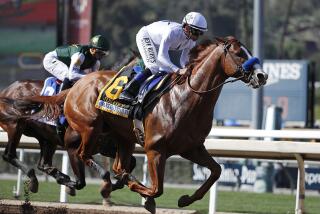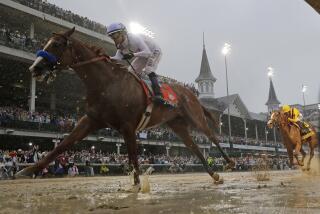NASCAR drug-testing policy has drivers on edge
- Share via
A few days after NASCAR suspended Jeremy Mayfield indefinitely for failing a drug test, Mark Martin called Dr. David Black, who administers NASCAR’s drug-testing policy.
He wanted to make sure anti-inflammatory medication wouldn’t get him a similar suspension. He was nervous.
Every time a doctor prescribes Jeff Burton something, he calls Black. He doesn’t want his reputation and his livelihood to take the blow that a positive test would deal it.
Mayfield’s suspension last week was the first such suspension of a Sprint Cup driver. It has put into the spotlight NASCAR’s year-old random testing policy. And with the sanctioning body’s swift action -- six hours after receiving Mayfield’s final test results, NASCAR made the announcement -- Martin and Burton wanted to make sure they were safe.
“When you pick up the paper and you see ‘zero tolerance,’ . . . What does that mean?” Martin said. “If you’re taking something as prescribed, what does zero tolerance mean? It’s our careers, man. . . . People have allergies, people have whatevers, injuries and stuff. I’m sure that’s all fine. Dr. Black says that’s all fine, but it’s still pretty scary.”
NASCAR’s drug-testing policy is the strictest and broadest in American professional sports. There is no drivers union to negotiate terms of a drug-testing policy or intercede on an accused driver or crew member’s behalf. Suspensions are indefinite and not appealable. There is also no complete list of banned substances for drivers; NASCAR can test for anything it wants.
Although some see it as a sign that the sport is serious about staying clean, others question its fairness.
“You have to have an appeals process,” said Stacy Robinson, the NFL Players Association’s director of player development.
He then referred to the lack of a banned-substances list for drivers.
“It’s like with anything, there’s got to be some guideline or criteria,” Robinson said. “Guys need to know what they need to stay away from.”
Since 1988, NASCAR has drug-tested upon suspicion. Receiving criticism for its highly subjective process, especially after former truck driver Aaron Fike’s admission of using heroin on race days, it added random testing this year. Each race week, NASCAR takes two samples from eight to 15 drivers and crew members.
Between driver and crew chief suspensions, NASCAR Chief Executive Brian France said competitors have tested positive for recreational and performance-enhancing drugs.
The fact that no legal agreement exists between drivers and the sanctioning body gives NASCAR a greater freedom than other leagues to be as strict as it wants.
Burton even said he thinks players’ unions have done more damage than good to drug-testing policies, blocking thorough testing.
Black said if there is the chance of a misunderstanding, those tested have the opportunity to explain themselves before being suspended. Drivers also have his cellphone number, which they can call whenever they have a concern. France said Mayfield is getting the opportunity to review the testing process for errors.
Mayfield said his positive result was because of a mixture of prescription and over-the-counter drugs. NASCAR disagreed. Mayfield’s only option is to undergo a drug-treatment program prescribed by a healthcare professional until NASCAR determines he can return to racing.
“We’re really after a very tough policy that’s thorough and that, most importantly, puts a very, very big deterrent forward for anyone who would like to think about violating that policy,” France said.
Burton said NASCAR’s strict stance means drivers have to be doubly vigilant.
“If you’re going to be doing something that’s legal and seems innocent to you, you’d better be on the phone, and you’d better be proactive,” Burton said. “It is your life. It is your career. It is your ability to make a living and it is your reputation, which at the end of the day, is everything you have.”
--
More to Read
Go beyond the scoreboard
Get the latest on L.A.'s teams in the daily Sports Report newsletter.
You may occasionally receive promotional content from the Los Angeles Times.











